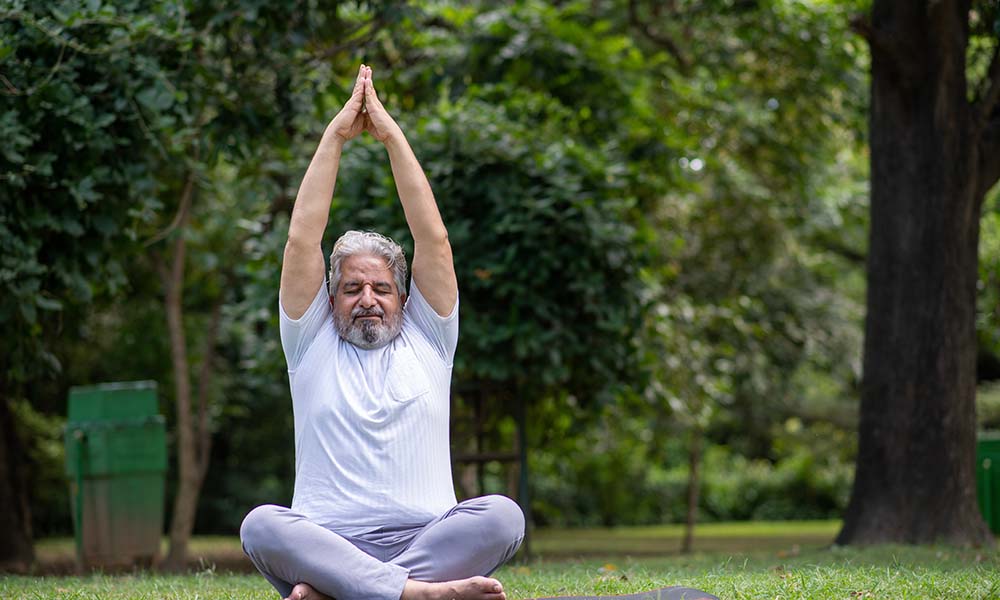Anxiety in Older Adults: Managing Stress for Healthy Blood Pressure

According to India's National Mental Health Survey, approximately 3.5% of the population experiences anxiety disorders annually, often due to factors like work pressure, relationship issues, or unnecessary fearful events.
While not all anxiety is harmful, unmanaged anxiousness can keep older adults in a persistent state of stress. Chronic stress can lead to increased heart rate, mood disturbances, and elevated blood pressure (BP). Emerging research suggests that stress and anxiety in seniors can significantly impact their cardiovascular health.
Can Anxiety Raise Blood Pressure?
Anxiety affects both emotional and physical well-being. As a natural response to stressors, anxiety triggers the release of cortisol, a stress hormone that increases heart rate and constricts blood vessels, leading to heightened blood pressure.
A 2015 review found that individuals with recurring anxiety are more likely to develop hypertension than those with lower anxiety levels. Some common signs of anxiety that may contribute to high blood pressure include:
Trembling or shaking
Excessive sweating
Headaches
Nausea or stomach discomfort
Irritability
Dizziness or shortness of breath
Can Stress Elevate Blood Pressure?
Both acute and chronic stress can raise BP by prompting the release of stress hormones such as cortisol and epinephrine. These hormones activate the body's "fight-or-flight" response, leading to an increased heart rate and temporary BP elevation. Prolonged activation of this response can cause sustained high blood pressure in older adults.
Signs of Anxiety-Induced High Blood Pressure
A healthy BP level typically ranges between 90/60 mmHg and 120/80 mmHg. However, for adults over 80, a reading under 150/90 mmHg is considered ideal. When BP exceeds this range, it may indicate hypertension.
Since it is not always feasible to measure BP instantly, recognizing symptoms of anxiety-induced hypertension is crucial. These symptoms include:
Increased sweating
Fatigue
Brain fog or confusion
Nausea or vomiting
Shortness of breath
Vision changes
Lightheadedness or dizziness
Can High Blood Pressure Cause Anxiety?
Just as anxiety can elevate blood pressure, hypertension may also trigger anxiety. Frequent BP spikes can create fear and stress, leading individuals to worry about their health. Symptoms of high BP that may induce anxiety include:
Headaches
Vision disturbances
Ringing in the ears
Irregular heartbeat
Managing Stress and Anxiety for Healthy Blood Pressure
Implementing self-care strategies can help manage both stress and BP effectively. Here are some useful techniques:

Regular Exercise
Engaging in light to moderate exercise for at least 30 minutes daily can improve overall well-being. Physical activity promotes the release of serotonin, a "feel-good" hormone that helps reduce stress, anxiety, and hypertension symptoms.
Meditation
Meditation fosters mental clarity and relaxation. Practicing meditation for 5-10 minutes each day can alleviate stress and improve emotional resilience.
Breathing Exercises
Deep breathing techniques provide oxygen to the brain and help regulate stress responses. Follow these steps for effective breathing:
Sit or lie in a quiet place.
Inhale deeply through the abdomen until your lungs are full.
Hold your breath for three seconds.
Exhale slowly and repeat several times.
Quality Sleep
Restful sleep is essential for mental and physical well-being. Anxiety can disrupt sleep patterns, making it important to establish a healthy routine and aim for 7-8 hours of sleep per night.
Heart-Healthy Diet
Consuming excessive salty or sugary foods can raise BP. A balanced diet rich in antioxidants, whole grains, fruits, and vegetables can support cardiovascular health.
Grounding Techniques
Grounding techniques can help seniors manage anxiety and stress-related BP spikes. The 5-4-3-2-1 method is a useful exercise:
Identify five things you see.
Identify four things you hear.
Identify three things you smell.
Identify two things you touch.
Identify one thing you taste.
Conclusion
The link between stress, anxiety, and high BP creates a vicious cycle. Frequent anxiety episodes can lead to hypertension, while high BP may trigger further anxiety. Addressing one condition can help alleviate the other.
Do you suspect having one or both conditions? If so, enrol for a professional consultation at Medanta!






